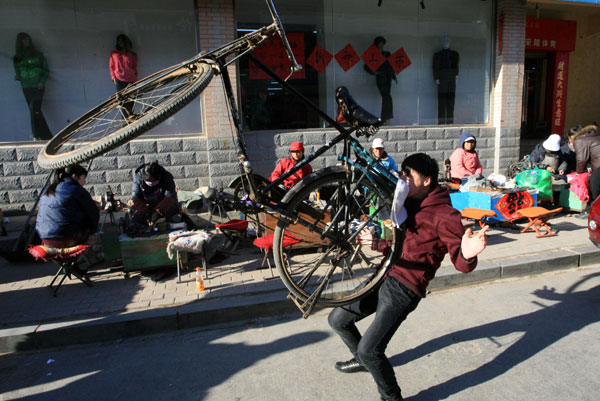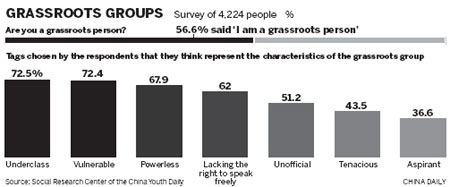Society
Many in China think themselves 'grassroots'
By Zhou Wenting (China Daily)
Updated: 2011-03-25 07:39
 |
Large Medium Small |
|
 Han Xi, a 26-year-old resident in Dalian, Northeast China's Liaoning province, lifts a bike with his teeth in this photo taken this month. Han practiced the stunt in preparation for his performance at a talent show held by Shandong Television Station that aims to provide a platform for grassroots stars. [Provided to China Daily] |
BEIJING - The use of the word caogen, the Chinese equivalent of grassroots, has become increasingly common in recent years with the rise of grassroots stars, culture and groups, indicating that many people consider themselves to be part of the fundamental level of society, according to a recent poll.
| ||||
Nearly 60 percent of the respondents said the description "grassroots" fits them well and said the word embodies the notion of being "underclass, vulnerable, and powerless".
The term is even being attached to a certain type of celebrity.
In China, an esteemed grassroots star is Han Han, a best-selling author and probably the most popular blogger in the country, who has attracted hundreds of millions of hits to his blog. To some observers, his fame stems from his use of bold words, which many believe express the hidden thoughts and feelings of those without power or influence.
"And in turn, grassroots people promote him to a higher position so that their voices can be more widely heard, especially by using various new media such as blogs and weibo (the Chinese equivalent of twitter)," said Wu Xia, a resident of Wuxi city, in Jiangsu province, and a regular reader of Han's blog.
She said she believes the grassroots movement mostly encompasses middle-class people who are fighting for their dreams like she is.
|
 |
Several sociologists said the grassroots movement reflects the advent of a more democratic society and of a public better able to exert its strength.
"Despite thinking that they are negligible, lowly, and powerless, people still want to present themselves and let their voices be heard," said Xia Xueluan, a sociology professor at Peking University.
"Most citizens, including white-collar workers, categorize themselves as being grassroots," according to Cui Lijuan, a professor of psychology and cognitive science at Shanghai-based East China Normal University.
"Some well-educated and well-paid people consider themselves to be grassroots as well, even though that often entails an attitude of detesting officials and the rich," Xia said.
Hu Xingdou, a professor of economics at the Beijing Institute of Technology, said: "In a modern society, citizens should have influence in decision-making process, management and supervision. Many people, therefore, use the word 'grassroots' as a taunt, to show they lack these rights."
He believes China is still far from being a civil society.
"In China, the official standard system is deeply rooted in people's minds," Hu said. "This should be replaced by the notion of civil rights, so that more people can understand and use their rights as leaders of the country."
Sociologists also said those who consider themselves to be part of the grassroots movement should try to avoid alienating themselves from elites.
Instead of having an antagonistic relationship, those belonging to the elite and grassroots group should strive to complement each other.
"The elite used to dominate those in the grassroots group, but now grassroots people can spread their messages farther.
"We should encourage a fusion of the two," Xia said. "The elite group can benefit the grassroots group. And the grassroots group, which is rooted in the public, and to some extent more vital, can give new life to the elites."
| 分享按钮 |



